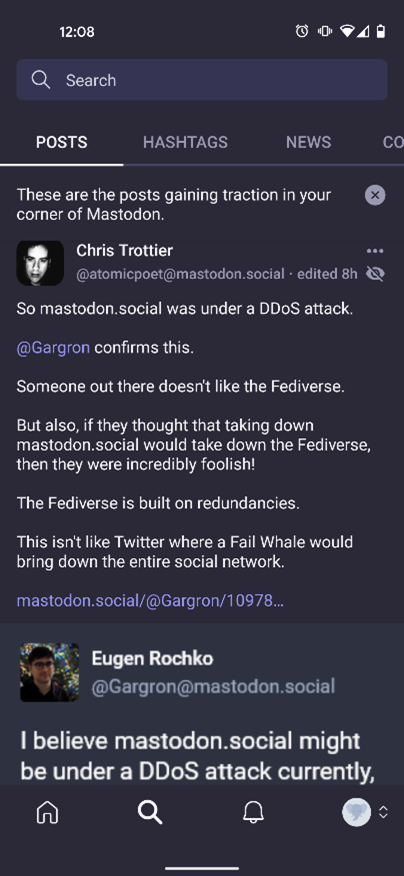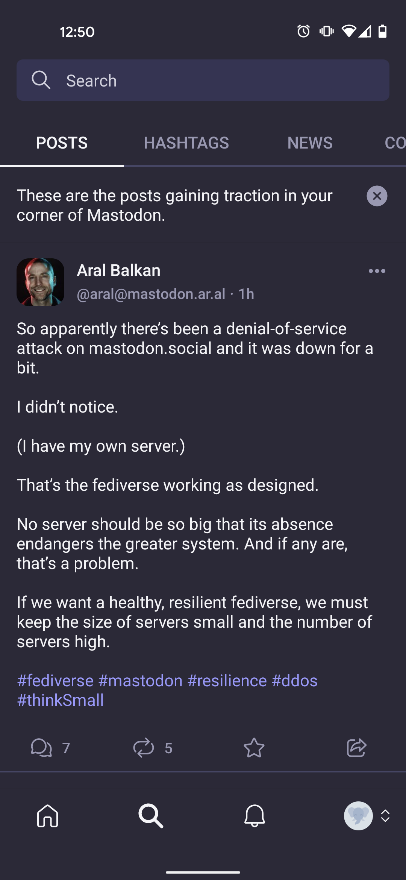
At Jisc, we do a lot of ‘horizon scanning’ – research that explores emerging tech trends. In the last couple of months, the ‘fediverse’ (a web of interconnected, federated servers) has been on our radar. I had never heard of the fediverse until Mastodon began to gain popularity following the frenzy resulting from Elon Musk taking over Twitter; the subsequent transition of the academic community to Mastodon did not go unnoticed at Jisc. So I decided to see for myself what it was all about.
In school, some 10 years ago now, I used Twitter obsessively. Nowadays though, despite being a young person working in tech, my social media usage is limited. I use Whatsapp and Facebook Messenger regularly as messaging services, and Linkedin every now and then. This is the extent of my social media presence. One reason for this is that I don’t find social media conducive to my mental health. Instead, I find that spending a lot of time on social media, particularly in an environment such as Twitter where interactions can often be unhealthy, is counterproductive to my mental health. Another reason I am reluctant to sign up to social media is data privacy concerns. I don’t want my data, particularly my interactions, to be accessible to big corporations such as Twitter. As a user, I find the most valuable aspect of Twitter the ability to engage with other users. I’m hoping to find this in Mastodon, without the aforementioned drawbacks of Twitter. So, having signed up to Mastodon, I journaled my own experience using it.
More specifically, I chose to carry out an auto-ethnography, a research method that seeks to analyse a subject through the medium of personal writing. This allowed me to spill my thoughts on to the page as I navigated through the fediverse. Yet, although structured as a narrative, auto-ethnographies are not intended as story-telling. Instead, through critical reflection of the personal experience, they offer an opportunity to understand wider cultural experience (Tyner-Mullings: 2019). To do this, the author has to locate the “position in the subculture or the educational path [they] are currently on as well as the positioning of others and how it might affect [their] perspective” (Tyner-Mullings: 2019). What resulted was not only an examination of the fediverse, but a critical reflection of my relationship with it against the backdrop of a wider cultural context.
Getting started
My experience using Mastodon got off to a good start. Before registering, users are shown a list of ’servers’ they can join. I am usually reluctant to commit to signing up to then be able to explore a service. I prefer assurance, almost a promise of a worthwhile experience before I cede any personal information. This opportunity to browse the various servers available encourages me to commit by piquing my interest. I select defcon.social, a network for people interested in the intersection of technology and society.
I am then asked to agree to several ’ground rules’. These include the usual warnings that harassment, impersonation and adult content are forbidden and that violating your agreement will result in a ban. Yet, what strikes me as different is that when I click on the code of conduct I am taken to defcon.social’s code of conduct. Does this mean that each network has its own code of conduct and so establishes its own rules? But then, how does moderating work in the federated universe? Is there an overarching authority that regulates behaviour within this federated system? If not, are there authorities within each network to enforce these rules? Or maybe there is no enforcement, but the users of each network come together to vote on alleged violations of conduct. I begin to wonder whether I am about to enter a sort of self-governing commune, a digital ancient Athens where direct democracy rules. That my primary interest is in how the fediverse is ‘governed’ is no coincidence; I am conscious it is a result of my own cultural/educational experience (I’m a politics graduate with a keen interest in political theory). In any case, I like that I’m signing up to this server and not Mastodon as a whole. I assume my data, if stored at all, will not be accessible to anyone outside of this server. I also assume that each server is moderated internally, however that might take place. Moderation on a small scale like this leads me to think it could be more effective.
Publishing
I see a familiar pen icon situated in the bottom right corner of the page. I click on it and am taken to a page which prompts me to “Type or paste what’s on your mind”. I’m posting, or I should say ‘publishing’ as the button on the top right of my page reads. I assume this will reach my fellow defcon.socialisers. I notice that there is a 500 character limit, more generous than Twitter’s which, when I last used it, was at 140. That there is a larger character count and the user ‘publishes’ what is on their mind indicates that Mastodon encourages more thought on the part of the user before sharing their views online with others. These features, while giving the user more freedom to write uninterruptedly, appear to be trying to nudge the user to give more care to their posts. By using the word ‘publish’, the user is made to question whether their content is really ready for ‘publication’. Here, the user is subtlety asked to assume the role of both the author and the editor. This may prompt the user to ask themselves among other things: is this content worthy of publication? Does it appeal to my target audience? Is this content in keeping with the code of conduct which I agreed to uphold? I consciously perceive this double role as I write my publication, more so than I remember doing on Twitter. There, I don’t remember feeling this responsibility, which instead lay with a force outside of my control. As I have mentioned, I don’t know to what extent Mastodon is moderated but it certainly feels as though the balance of power has shifted in my favour. I like this responsibility and feel as though it could provoke healthier interactions than Twitter by simply nudging the user to stop and think before posting. I publish the following: “Hello world (test)” and it appears on my home page.
Security
I want to explore my server or ‘instance’. I click the search icon and I’m taken to ‘Posts’ where I see posts from various users that seem to deal sporadically with the themes of technology and society. These are, according to Mastodon, “the posts getting traction in my corner of Mastodon”, but they don’t appear to be limited to posts within my instance. As I scroll down, I notice that most of the posts are discussing news of a recent DDoS attack on mastodon.social. This seems to not be causing as much alarm as one might expect. Users are quick to pronounce the attack as ‘unsophisticated’ and are praising the fediverse for its resilience. One user writes “if they thought that taking down mastodon.social would take down the fediverse, then they were incredibly foolish!” Another considers this proof of the robustness of the fediverse thanks to its small and numerous servers. I am immediately able to grasp the enhanced security that a decentralised, federated system provides. While an attack on one server might bring that server down, this would not disrupt other servers which operate autonomously within the super-structure. I’m reminded of a radio broadcast I listened to on the weekend, titled ‘Why Coups Fail’, in which it was pointed out that centralised states are much more vulnerable to military coups than decentralised states, as in the case of the latter power is scattered over several locations and cannot be overthrown at one centre. For this same reason, I feel that I could rely on Mastodon to provide a stable and secure service in a way that services outside of the fediverse could not deliver. This also makes me feel like my data is safer in the fediverse.

 Community
Community
I haven’t actually followed anyone yet, so I do so. A feed has now developed on my home page. This works in very much the same way as Twitter – I see posts from the users I follow and their reposts. Unlike Twitter though, as well as this home feed, I can enter another space – my community. This is where I find posts from other users of defcon.social, without needing to follow them. Again, as I scroll through, I notice the content only sporadically fits under the themes of technology and society. Though I am seeing posts that have been written by other members of my instance, content isn’t necessarily restricted to those themes. I find that most of what I read doesn’t appeal to me and it feels less like a community because of that. It instead feels like a series of unrelated posts with its fair share of spam. There is little cohesion in this community. Despite its focus on communities, it doesn’t feel like one. It feels just like Twitter, a space for people to share what’s on their mind.
Epilogue
Through exploring Mastodon I have recognised the fediverse’s ability to safeguard both user data and rights. This makes Mastodon a more secure and socially responsible alternative to Twitter. Yet, these conditions do not seem to have established a space where discussion thrives. Despite the platform’s attempts, I experienced little engagement between users. Journaling my experience using Mastodon has also become an introspective activity. Having reflected on my findings, I now suspect that it is not in spite of but precisely because of my demographic, and my cultural experience, that I have the relationship I do with social media. Having grown up in the digital age, I have experienced the pernicious effects of social media on my health which has made me so wary of it. I work in tech because I am interested in it and its role in society, an interest that has no doubt shaped my attitude towards big tech (and the power it derives from access to our data). Mastodon has alleviated my data privacy concerns that normally arise when I have used social media in the past but the absence of a sense of community means that I will be deactivating my account.
